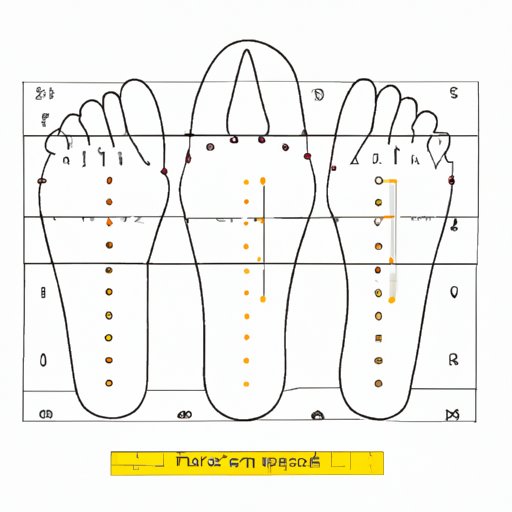
Introduction
If you’ve ever bought shoes that feel too tight or just don’t fit right, you know how uncomfortable they can be. One reason for this is that foot width is just as important as foot length when it comes to finding the perfect fit. In this article, we’ll explore the topic of foot width, why it’s crucial to measure it, and how to measure foot width correctly.
Step-by-step Guide for At-Home Foot Width Measurement
Taking the time to measure your foot width at home can help you find the perfect fit for shoes purchased online or before visiting the store. This method may not necessarily be as accurate as having a professional measurement at a store, but it can provide a reasonable approximation.
To measure your foot width at home, follow these steps:
Gather Necessary Tools
You will need a ruler, a piece of paper that’s larger than your foot, and a pen or pencil.
Tracing Foot in Standing Position
Stand on the piece of paper and trace the outline of your foot with a pen or pencil, being careful to hold the pen/pencil straight up from the paper. Make sure your weight is distributed evenly on both feet.
Measuring Widest Part of Foot (Ball or Metatarsal)
Locate the widest part of your foot on the traced image. Usually, this is the ball or metatarsal area, which is just behind your toes. Measure the distance between the two vertical lines that are the farthest apart using the ruler.
Comparing Measurement to Shoe Sizing Charts
Now that you have your measurement, you can compare it with shoe sizing charts. Keep in mind that shoe sizing charts vary among manufacturers, so it’s important to consult the one that corresponds to the brand or type of shoes that you want to buy.
Other Methods for Measuring Foot Width
In addition to measuring foot width at home, there are other methods people can use to measure their foot width.
At the Store with a Brannock Device
One of the most common methods of having foot width measured is using a Brannock device available at shoe stores. This device is designed to measure both foot length and width, and it can be very accurate.
Using Online Sizing Tools
Many shoe manufacturers and websites offer sizing tools, which are guides designed to help you measure your feet at home and determine which shoe size to order. These sizing tools may ask for your foot length, width, or both, and they can provide a good estimate of the shoe size you need.
Tools for Measuring Foot Width
If you decide to measure your foot width at home, there are different tools available on the market that can help you do so accurately.
Foot Sizing Charts
Foot sizing charts may have various shapes, but they all provide instructions on how to position the ruler when measuring your foot width. You should always use a chart that corresponds to the brand and style of the shoes you want to buy for the best results.
Printable Foot Measurement Templates
Printable foot measurement templates are an excellent tool for those who want to take accurate measurements at home without the need for a ruler. Templates can be printed on a piece of paper, and you can then trace your foot using a pen or pencil.
Smartphone Apps
Some smartphone apps can also help you measure your foot width using your phone’s camera and augmented reality. These apps use your phone’s camera to create a 3D model of your foot and then give you the most accurate measurement. However, these apps may not be as accurate as other measuring tools and could come with a fee.
Measuring Foot Width for Children
Measuring foot width is essential for children as they grow, especially because they are more likely to experience changes in their feet’ width. You should measure your child’s foot width frequently to ensure that they have properly fitting shoes.
Parents or Caregivers Should Know When and How Often to Measure Children’s Foot Width
It’s important to measure your child’s foot width whenever they seem to have outgrown their shoes or feel uncomfortable while wearing them. Newborns and infants should be measured every two to three months, while preschoolers and older children can be measured every four to six months.
Signs that Indicate a Child May Need New Shoes Due to Foot Growth
You should be on the lookout for signs that your child needs new shoes due to foot growth. These signs include blisters, corns, and calluses, which show that shoes are rubbing against the feet and causing irritation. If you notice any of these signs, it’s a good sign that your child needs new shoes or a larger shoe size.
Foot Width for Performance and Health
Foot width plays a vital role in foot health, and the proper fit is especially important when it comes to performance or medical conditions.
Athletes Needing Specialized Footwear
Athletes need shoes that can provide the best performance based on their specific sport. Therefore, having accurate measurements of both foot length and width is essential when choosing shoes that will accommodate different foot shapes.
Individuals with Medical Conditions Needing Customized Shoes
Individuals with medical conditions such as diabetes or foot deformities caused by trauma or genetic factors require shoes that fit precisely. Custom shoes help to prevent injuries and offer greater comfort to ensure that people with such conditions enjoy a normal life.
Conclusion
In conclusion, measuring foot width is essential for keeping feet healthy and comfortable. This article provides a guide on how to measure foot width at home, describes other methods of measuring foot width and the tools available to do so effectively. It also outlines why measuring foot width is essential, especially for children, athletic performance, and medical conditions. Remember that taking the time to measure foot width is worth every step towards better foot health.





